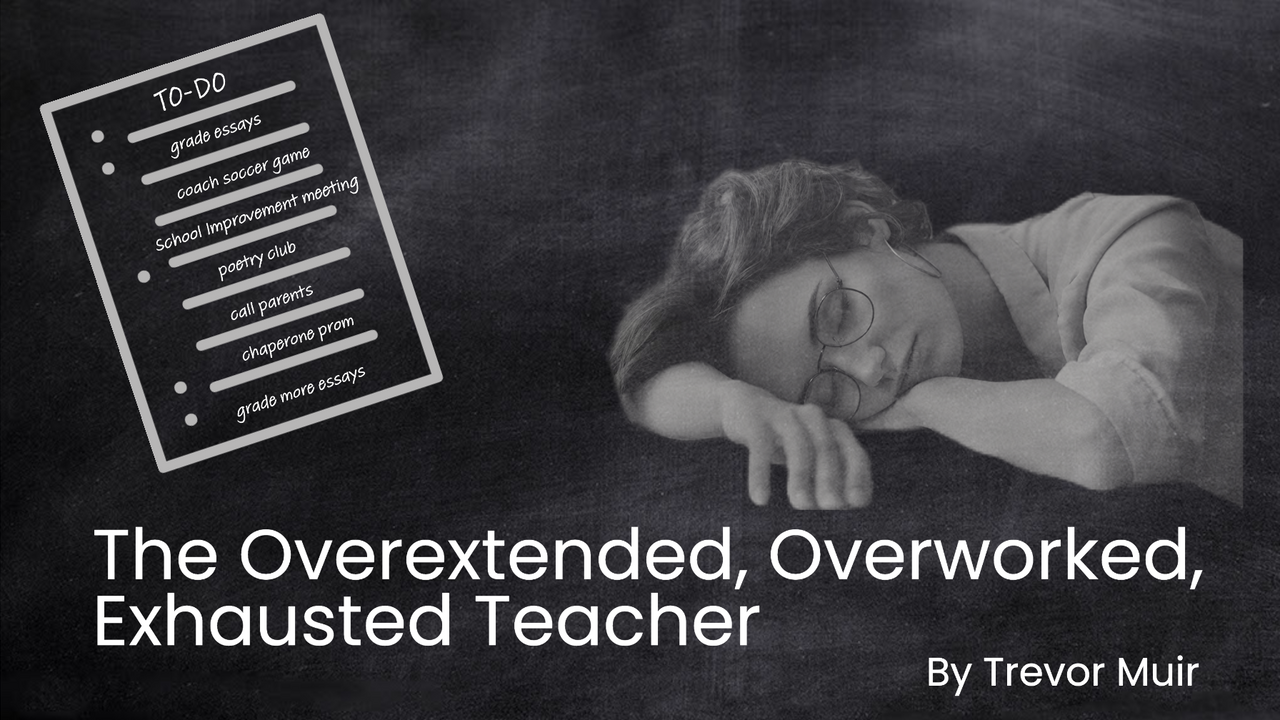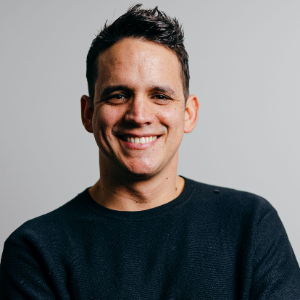
The Overextended, Overworked, Exhausted Teacher
May 24, 2022One time at parent-teacher conferences, one of my students and his mother sat down in front of me at my table in the middle of the high school gymnasium. I started our meeting by shaking the mom's hand and telling her how much I enjoyed having Thomas in my class. I said that Thomas works really hard, participates often, and is so kind to other students. However, the whole time that I was telling this mother about Thomas, I could see a grimace growing across her face. She just silently sat there in anger as I praised her son, Thomas.
So I paused and asked, “Is everything alright?”
The mother took a deep breath and said, “My son’s name is Colin.”
Oops.
I mixed Colin up with another student, and his mother was rightfully not too pleased about it. No amount of apologizing seemed to make her feel better either.
While I still get a pit in my stomach when I tell this story (I laugh about it too, because that’s just funny), I can pinpoint why it happened.
In the two months leading up to this parent-teacher conference, I had completed 3 massive projects with my students, sat on the school improvement team, chaperoned Homecoming, coached middle school soccer, ran a poetry club, taught five different preps, graded every assignment I assigned, and had a newborn baby at home.
My brain was fried. I was overextended, overcommitted, and absolutely exhausted. The result of this was mixing up students’ names and making parents angry with me.
You cannot pour from an empty cup.
However, the larger result was my overall performance as a teacher. Because I was doing so many things and so little to care for myself, my energy was depleted in each of the areas I was giving it. My players on the soccer team were only getting a portion of my energy (and we lost a lot of games). The teaching committees I was on received lackluster engagement. My students were experiencing a tired teacher. Even my new daughter was getting a substandard version of myself.
The adage, “You cannot pour from an empty cup,” was increasingly true in my life. It was at this breaking point, that I knew I need to make some changes in my life if I had any hope of sustaining and thriving in my career. So I learned to take better care of myself in order to reclaim my energy and thrive in my work. Here are a few things I started doing.
Stay Connected With Colleagues
One of the key indicators of a healthy person with a strong well-being is someone who is in community with others. Research shows that relationships reduce stress and even have an impact on physical health. This is why it is so vital that educators stay connected with their colleagues. Few people beyond those who work in schools understand the daily pressures, stresses, and joys of being an educator. Teachers need people who they can commiserate and celebrate with. They need elders for wisdom, younger ones for energy, people in the same boat as themselves to share and receive ideas.
As I was approaching teacher-burnout, I realized how isolated I truly was. While teachers are surrounded by hundreds of students every day, it's easy to go a whole week without talking to another professional. When I started dedicating time to having lunch with others, stopping by the staff office, or even just sitting with someone else during my planning period, my mental health and well-being saw a huge improvement.
Develop a Reflection Practice
Part of caring for yourself well is taking the time to simply reflect. In the midst of loaded schedules and packed calendars, finding 15 minutes at the end of each day to pause and reflect on what went well and what could use improvement is not easy. However, creating an intentional practice of reflection is essential. Author Jennifer Porter writes that, “Reflection gives the brain an opportunity to pause amidst the chaos, untangle and sort through observations and experiences, consider multiple possible interpretations, and create meaning.”
If all we ever do is move on to the next thing— the next class, the next assignment, the next lesson, the next podcast, the next meeting, the next day— then we never get a chance grow from all of these experiences. Whether it’s through journaling, meditation, reading and reflecting on a set of prompts, or simply turning off the radio on the drive home, finding time to reflect can have a measurable effect on your performance and well-being.
Indulge in Non-School Activities
Education books are great. Educator Facebook, Instagram, and Tik Tok pages are great. Educator podcasts are great. Continually absorbing information and ideas to learn and grow as an educator is great.
But you also need to regularly take off your teacher hat. A healthy life is a well-balanced life, and so only consuming teacher resources and engaging in teacher activities can actually be counterproductive as a teacher. You need time as a person, a friend, a parent, and a hobbyist if you want to be a successful teacher. So regularly invest time to go on hikes, read novels, try new hobbies, listen to non-teacher podcasts, or whatever else helps you fill your cup so that it can overflow to others when you put your teacher hat back on.
Offer Yourself Grace When You Are Less Than Perfect
I don’t know if you need to hear this or not, so I will say it anyway: you don’t need to be perfect to be a great teacher.
That’s right, you don’t have to grade every assignment, make every lesson huge and exciting, sign up for every committee, and respond to every parent email within 5 minutes to be highly effective. You only have so much capacity, especially now, and you cannot expect yourself to be perfect at everything you do. Now more than ever, you need to offer yourself grace for when you are imperfect. If a lesson did not go great, forgive yourself; you will get another chance tomorrow. If you were short and snapped a little too loud at a student for playing Fortnite during your class, forgive yourself again.
There is too much going on right now to be bogged down by unnecessary shame and guilt. Instead, offer yourself grace and extend that grace to others. Freeing yourself from the pressure to be perfect will give you so much more capacity to thrive in the work you do.
Learn to to Say NO
I'm a huge fan of the word YES, and think it leads to new experiences, growth, and adventure. However, after mixing up Colin with Thomas in front of his mother, I learned I need to also embrace the word no. I needed to learn to say things like:
“I’m sorry, I’m not able to stay late to tutor you today. But practice this at home and I can check in with you before school tomorrow.”
And,
“No I don’t have a big simulation or project planned this week; we are tackling the grammar unit.”
And,
“No, I can’t coach the soccer team.” “No, I can’t chaperone the dance.” “No, I can’t be on that committee.”
I learned to say no, and it did wonders for my emotional and physical health.
However, it also did wonders for my students. Because I began to care better for myself, I had more capacity to care for them. I learned a lesson that every educator should learn before day one in the classroom: Teacher-care is student-care. If my cup is full, it is much more likely to overflow to my students.
Learn to to Say YES
Sometimes you need to say NO, but sometimes you need to say YES. Many teachers report job dissatisfaction because they feel stuck and bored from being in the same place, doing the same thing for years. This has its own draining effect. Change is hard. Change takes time and energy you may not feel you have. But feeling stagnant can be even more draining. So many people report job dissatisfaction because they feel stuck and bored of being in the same place they've been for years.
So if that's you, make some changes. Say yes to new opportunities.
They don't have to be monumental changes either. Maybe change the way you teach a single unit. Use new videos, incorporate a simulation, try a project, give a new assessment, start class off in a new way — Could your new way fail?
Of course. But the world will keep spinning, and at least you’ll feel alive. You can try again next time.
Speaking from experience, making changes can do wonders for how you feel about your work. Change isn’t about adding more to your plate; it’s about finding joy in what you already have, and that might mean switching some things out and trying something new.
Teaching is not a sprint, it's a marathon. When I learned how important endurance is, and the power community and reflection can have in the midst of the long-race, I found I was not only a better teacher, but a much healthier person.
Stay Connected With Trevor's Work
Join thousands of educators who receive weekly articles, videos, and inspiration from Trevor.
SPAM is the worst. I promise to only send you my best stuff and NEVER to share your email.

